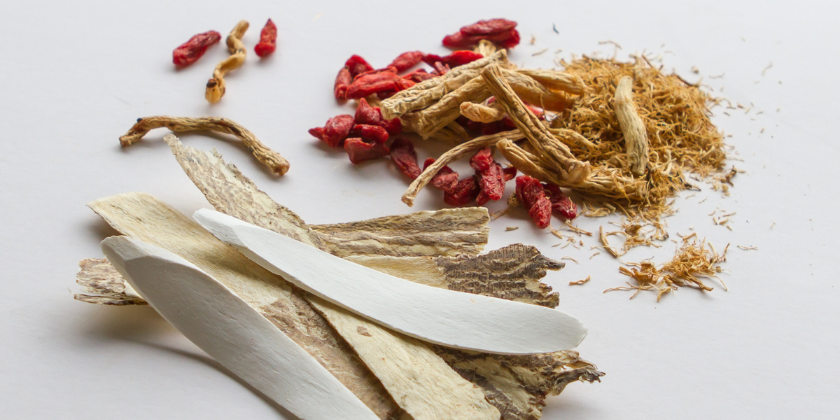In Traditional Chinese Medicine theory, herbs are used to prevent or treat disease, balance the body’s energy, and help the body heal. The use of herbs in Chinese Medicine is called herbology or phytotherapy. This article lists some of the most commonly used immunity-boosting herbs in an Acupuncturist's toolkit. It also covers some of their common indications, actions, and formulations.
Astragalus
Astragalus root is a Chinese herb used to boost the immune system and increase the body’s resistance to disease. This herb is one of the 50 fundamental Chinese herbs and is used as a valuable tonic herb. Astragalus is used to boost the immune system, improve digestion and circulation, strengthen the liver, and kidneys and relieve pain. The root of this plant is commonly used in Chinese herbal formulas for the elderly as an anti-ageing herb. Astragalus is also known for its antiviral, anti-inflammatory, and immune-boosting properties.
Ginseng
Ginseng is a plant that has been used for centuries in traditional Chinese medicine. The root of the plant is dried and powdered, and then typically taken as a tea or capsule. Ginseng is thought to help with a variety of issues, including fatigue, anxiety, and low libido. It is also sometimes used as a general tonic to help improve overall health.
While ginseng has been used safely for centuries, it can interact with some medications and should be used with caution. Consult with a healthcare provider before taking ginseng to ensure it is safe for you.

Goji Berry (Chinese Wolfberry)
Goji berries are bright red-orange berries that are commonly used in Chinese herbal formulas. Gou Qi Zi is one of the common Chinese names used for goji berries. This means “autumnal lids and stems.” Goji berries are also known as wolfberries. This herb is used to boost the immune system, improve eye health, strengthen the spleen, and relieve stress.
It is a powerful antioxidant and is commonly used in TCM herbal formulas to protect the body’s cells from damage caused by free radicals. Goji Berries have been consumed for generations in Asia and are believed to improve the longevity of life.
Cordyceps
Cordyceps is a Chinese herb used to boost the immune system, increase energy, and promote longevity. Cordyceps is commonly known as the “king of tonic herbs.” It is one of the 50 fundamental Chinese herbs and is used as a valuable tonic herb in Chinese medicine. Cordyceps is used to boost the immune system, promote liver health, increase energy, and reduce stress. Cordyceps is also used to promote longevity and reduce fatigue and is believed to extend human life by 10 years if consumed regularly.
Elecampane
Elecampane has a long history of use in Chinese Medicine. Its botanical name, Inula helenium, comes from the Latin word for "sun," which is fitting because elecampane is thought to bring warmth and energy to the body. According to Chinese Medicine theory, elecampane is used to treat several respiratory disorders, including bronchitis and asthma. It is also said to boost the immune system and aid in digestion.
Elecampane root is typically taken as a tea or tincture, and it is sometimes used in formulas with other herbs. While there is no scientific evidence to support these uses, elecampane is considered safe when taken in small doses.

Licorice
Licorice is a sweet-tasting root that has been used in Traditional Chinese Medicine for centuries. It is thought to have several health benefits, including aiding digestion and helping to reduce inflammation. In Chinese Medicine, licorice is often used with other herbs to balance the effects of the other ingredients. For example, it may be added to formulas that contain cooling herbs to offset their heat-producing qualities.
Additionally, licorice is thought to help harmonize the various flavors in a formula, making it more palatable. Due to its wide range of uses, licorice is considered an important herb in TCM and is used in many formulas. It is commonly used in herbal formulas for the elderly, pregnant women, and children.
Chinese Rhubarb
Chinese rhubarb is a perennial plant that has been used in Chinese Medicine for centuries. The plant contains several compounds, including anthocyanins and ascorbic acid, which have antioxidant properties. It has also been used to treat conditions such as digestive issues, skin irritation, and diarrhea. Studies have shown that rhubarb may help treat inflammatory bowel diseases (IBD), such as Crohn’s disease and ulcerative colitis. It may also improve symptoms of IBD, including diarrhea, pain, and weight loss.
Conclusion: Addressing the Root
As you can see, there are many herbs in Chinese Medicine that are commonly used to boost the immune system and prevent disease. In general, these herbs are used to promote health and prevent disease by strengthening the body and treating the root cause of disease rather than just treating symptoms.
Care Consideration: Just a reminder that the above information is not a substitute for medical care and is not a substitute for medical advice or recommendations from a healthcare provider. This information is not intended to treat, mitigate or cure any disease. That said, we encourage you to connect with an Acupuncturist in your community to learn more about this and other Traditional Chinese Medicine options. If you’ve got questions about Chinese herbal medicine or getting started with an Acupuncturist, feel free to connect with us on hello@mydaolabs.com.
















